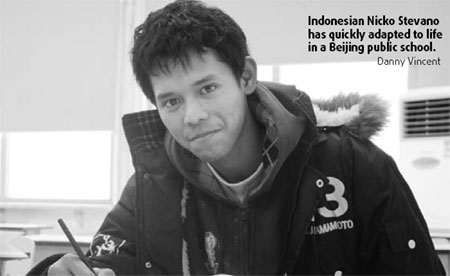
|
OPINION> Commentary
 |
|
Learning in the Nicko time
By Danny Vincent (China Daily)
Updated: 2008-12-08 07:34  Younger pupils in Nicko Stevano's school often mistake the Indonesian student for a foreign English language teacher. Other foreign students at a nearby international school sometimes think he is Chinese because of his mannerisms. But most agree that Stevano speaks Chinese like a native. "People say that if you cover your eyes and listen to him speak you would think he was Chinese," his English teacher Amanda He says. The 19-year-old was the very first international student to join Ritan High School in 2003 when the school was granted key school status and became one of 86 public schools in Beijing allowed to accept international students with little or no Chinese language ability. He is also a testimony to how quickly even older students can learn Mandarin in ordinary, State-run public schools. Stevano was 14 when he arrived at the school and admits he was unable to understand "anything" when he started. It took a year for him to acquire Chinese and now he jokes that he is in danger of forgetting his native tongue. "His Chinese is pure," his teacher says with a light tap on his arm to encourage him to answer in English. But Stevano's language advance was not without its usual hiccups. "I used to find ancient Chinese poems difficult and got confused as many words that have the same sounds but have different writing," he says. "But now I speak more Chinese than Indonesian every day." Expat children who study in China have the opportunity of learning one of the most important languages today and the advantages of studying with natives are sometimes even surprising to the teachers. Xin Lihong, dean of the international department at Ritan High School in Beijing, is often still amazed by how quickly international students can pick up Mandarin and excel in other subjects too. "One South Korean student in grade 10 studied Chinese for just one month before being put into an all-Chinese class," she says. "One year later he made great progress and now he gets good grades in many subjects." The fear of kids falling behind in core subjects while trying to play catch-up in a different culture and language is often a concern to expat parents. "Not all parents want to send their kids to public schools, most want to send them to private ones," Xin says. "Maybe because they have the same courses as in Western countries like A Levels from England and IB from the US." Liu Zhenhua, a director at the school, says the course is not that different in China, but the way that the teachers teach can be. "It depends on the personality but some of the students can catch up with their classmates very quickly. In subjects such as chemistry, physics and math, China has a very good basic education," Xin says. (China Daily 12/08/2008 page8) |